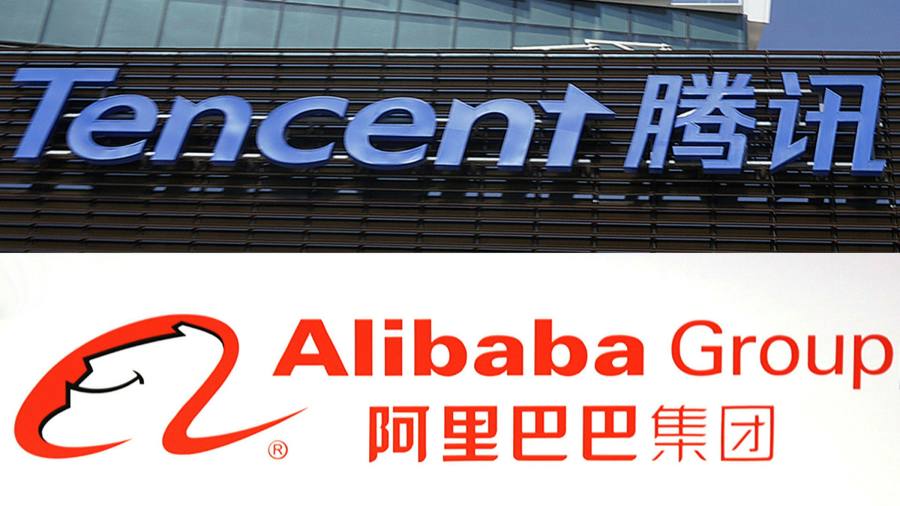[ad_1]
Chinese internet powerhouse Tencent Holdings outspent Alibaba Group Holding in investments in start-ups during 2020, forking out more than $12bn to buy shares in 163 businesses across a wide range of industries.
Tencent became the biggest spender on start-ups among China’s non-financial companies under an aggressive but carefully designed growth strategy that was driven by making loose partnerships cemented by capital ties. But Beijing’s moves to step up efforts to monitor and control its big tech groups could test the viability of the strategy.
When Kuaishou, a Chinese video app, made its stock market debut in Hong Kong in February, investment funds both at home and abroad said in unison that the biggest winner in the process was Tencent.
Since 2017, Tencent had on several occasions bought Kuaishou shares, amounting to a total investment of about $2.8bn. As the Kuaishou stock soared on its initial public offering, Tencent counted more than $18.4bn in profit on paper.
Kuaishou is widely viewed as the principal rival to ByteDance, the Chinese company that owns the short video app TikTok. The successful IPO has catapulted its market capitalisation to more than HK$1.2tn ($154bn), bringing a huge windfall gain to Tencent.

This article is from Nikkei Asia, a global publication with a uniquely Asian perspective on politics, the economy, business and international affairs. Our own correspondents and outside commentators from around the world share their views on Asia, while our Asia300 section provides in-depth coverage of 300 of the biggest and fastest-growing listed companies from 11 economies outside Japan
In addition to its own video app, Kuaishou also offers videos via WeChat, the multipurpose messaging, social media and mobile payment app developed by Tencent and used by 1.2bn people.
Both Tencent and Kuaishou have expanded their customer base and services through their partnership. This is a typical case of the Tencent strategy working well.
Tencent began serious efforts to invest in start-ups in the late 2000s and by the end of February 2020 had acquired a stake in about 880 companies, according to Beijing Suiyue Juzi Technology, a Chinese research group.
In 2020, it poured capital into 163 companies, up 40 per cent from 2019, for total investment of more than ¥1.3tn ($12bn) excluding cases where the amount was not disclosed.

Tencent’s investment strategy has been tilted heavily towards the entertainment and game industries, with stakes in 183 and 142 companies in these two sectors, respectively.
The internet behemoth, which earns the largest portion of its profits from the gaming business, has been reaping hefty benefits from synergies generated by its capital and business ties with the providers of gaming, music and video services. It has also invested in overseas companies including PlatinumGames, an Osaka-based game developer.
Unlike domestic rival Alibaba, which often tries to acquire controlling stakes, Tencent prefers to remain a minority shareholder and avoids directly meddling in the management of the companies in which it invests.
Companies partly owned by Tencent that have gone public include Pinduoduo, an interactive ecommerce platform; Meituan, a leading food delivery service; and Singapore-headquartered Sea, which operates online gaming, ecommerce and digital financial services.
Tencent’s investment portfolio also includes a bevy of unicorns, or private companies with a valuation above $1bn, such as WeDoctor, the world’s leading medical health technology platform.
Tencent’s stakes in listed start-ups excluding its subsidiaries grew to a value of Rmb890.7bn ($137bn) at the end of September 2020, posting a 12-fold jump in five years, according to the company’s financial statements.
However, its investment drive is facing political headwinds due to Chinese president Xi Jinping’s campaign to tighten control over big tech companies.
Chinese regulators announced on March 12 that 12 companies including Tencent had been fined for making acquisitions without notifying authorities, saying the moves violated anti-monopoly rules. According to regulators, Tencent failed to notify them about its 2018 acquisition of Yuanfudao, an online tutoring platform.
Tencent chief executive Ma Huateng recently expressed his loyalty to the Xi administration by calling for tighter governance of the internet economy at China’s parliamentary meeting in Beijing.
Ma made the proposal at the National People’s Congress, which started on March 11, urging the government to strengthen oversight over certain platform providers to ensure the safety of users.
Tencent offers online financial services including a mobile retail banking unit targeting consumers and small businesses. They are similar in nature to those provided by Ant Group, the fintech group backed by Alibaba, which has been forced to delay its scheduled IPO.
In December, a Tencent subsidiary and Alibaba were fined by China’s antitrust regulators for anti-competitive practices. Tencent will face heightened risk of government intervention if it draws attention from regulators for possible irregularities concerning licensing and business scope.
So far, the company has been able to reap benefits from its relatively small stakes in companies because of the huge popularity of WeChat, which serves as a messaging and payment app.
But Tencent’s growing earnings and valuation have helped obscure some governance issues stemming from the fact that companies in which it has invested have quietly complied with the wishes of the tech conglomerate despite its minority stakes. The company has a clear interest to do everything it can to avoid any rigorous regulatory scrutiny of its investments and operations.
Additional reporting by Yusuke Hinata in Guangzhou, China
A version of this article was first published by Nikkei Asia on March 16 2021. ©2021 Nikkei Inc. All rights reserved
Related stories
[ad_2]
Source link






